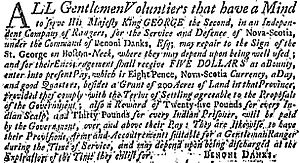Danks' Rangers facts for kids
Quick facts for kids Danks' Rangers |
|
|---|---|
| Active | 1756–1762 |
| Country | |
| Allegiance | British Crown |
| Branch | British Army Ranger |
| Type | Reconnaissance, Counter-insurgency, and Light Infantry |
| Role | Reconnaissance, counter-insurgency, and light infantry operations |
| Size | One Company |
| Garrison/HQ | Fort Cumberland (1756–1762) |
| Engagements | French and Indian War |
| Commanders | |
| Notable commanders |
Captain Benoni Danks |
Danks' Rangers was a special military unit formed in colonial North America during the Seven Years' War, also known as the French and Indian War. This war was a big conflict between Great Britain and France, with their allies, for control of land in North America. The unit was led by Captain Benoni Danks.
Danks' Rangers were similar to another famous group called Gorham's Rangers. They were created in 1756 to help protect British soldiers in Nova Scotia. Their main job was to fight against Acadians and Mi'kmaq people who were resisting British rule in the area. The Rangers mostly operated in parts of Nova Scotia and what is now New Brunswick. The unit usually had about 100 to 125 men.
Contents
What Danks' Rangers Did
Danks' Rangers were known for their special skills. They performed reconnaissance, which means they gathered information about enemy movements and areas. They also engaged in guerrilla warfare, using small, surprise attacks instead of large, open battles.
Their Role in Key Events
The Rangers played an important part in the Expulsion of the Acadians, where many Acadians were moved from their homes. They also took part in several major battles during the war.
Important Battles and Challenges
- Louisbourg (1758): The Rangers were involved in the landing at Louisbourg, a key French fortress.
- Quebec (1759): They participated in the Siege of Quebec, a very important battle where the British captured Quebec City. During this siege, the unit faced many attacks from Canadian militia and their Native American allies. Captain Danks was seriously injured.
- Havana (1762): Later, Danks' Rangers joined with Gorham's Rangers to form a larger group. They took part in the Siege of Havana in Cuba. Sadly, many soldiers in the unit became sick with tropical diseases. Because of this, the unit was eventually disbanded. The soldiers who survived joined other British Army regiments.
Who Was in the Company?
The soldiers in Danks' Rangers came from different backgrounds. Many were "Yankees" from New England. There were also Scottish and Irish immigrants. Interestingly, a few Native Americans from New England also served in the company.
 | Kyle Baker |
 | Joseph Yoakum |
 | Laura Wheeler Waring |
 | Henry Ossawa Tanner |


